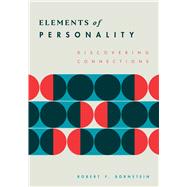
Note: Supplemental materials are not guaranteed with Rental or Used book purchases.
Purchase Benefits
What is included with this book?
Preface
Acknowledgements
Chapter 1. What Is Personality?
Why Study Personality?
Four Perspectives on Personality
Culture and Personality
Personality Research Methods
Personality: Discovering Connections
Chapter Review
Critical Thinking and Discussion Questions
Key Terms
Additional Readings and Resources
Chapter 2. The Psychodynamic Perspective
Eels, Brains, Cocaine, and Hypnosis
Key Assumptions of the Psychodynamic Perspective
The Topographic Model
The Structural Model
The Psychosexual Stages
Psychoanalytic Treatment
Psychoanalysis Reimagined: Object Relations Theory
The Self-Representation and the Self–Other Dialectic
Integrating Representations of Self and Other People: Attachment Theory
Contemporary Psychoanalytic Treatments
Chapter Review
Critical Thinking and Discussion Questions
Key Terms
Additional Readings and Resources
Chapter 3. Behavioral and Cognitive-Behavioral Models
Psychology as the Behaviorist Views It
Key Assumptions of the Behavioral Perspective
Pavlov and Classical Conditioning
Skinner and Operant Conditioning
Conditioning and Personality
Conditioning and Psychopathology
Behavior Modification and the Token Economy
The Shift From Radical Behaviorism to an Integrative Behavioral Perspective
Cognitive Behavioral Treatments
Chapter Review
Critical Thinking and Discussion Questions
Key Terms
Additional Readings and Resources
Chapter 4. Trait and Interpersonal Frameworks
A Visit to Vienna and the Birth of Trait Theory
Trait Theory in Context
Key Assumptions of the Trait Perspective
Allport’s Lexical Approach
Cattell and Factor Analysis
A Consensus Emerges: The Five-Factor Model
Traits and Dynamics: The Interpersonal Perspective
Assessing Interpersonal Constructs
Interpersonal Dynamisms
Psychopathology and Psychotherapy
Chapter Review
Critical Thinking and Discussion Questions
Key Terms
Additional Readings and Resources
Chapter 5. Humanistic and Existential Approaches
Divergent Experiences, Converging Philosophies
Key Assumptions of the Humanistic Perspective
A Radical Departure
Maslow: A Hierarchy of Needs
Rogers: Self-Discrepancies
Existential Personality Theory
Existentialism Quantified: Terror Management Theory
Effects of Mortality Salience on Behavior
Chapter Review
Critical Thinking and Discussion Questions
Key Terms
Additional Readings and Resources
Chapter 6. The Future of Personality
Paradigms of Personality: Past, Present, and Future
Where Are We Now? Converging Themes
Where Are We Going? The Future of Personality
Why Are We Here?
Chapter Review
Critical Thinking and Discussion Questions
Key Terms
Additional Readings and Resources
References
Index
About the Author
The New copy of this book will include any supplemental materials advertised. Please check the title of the book to determine if it should include any access cards, study guides, lab manuals, CDs, etc.
The Used, Rental and eBook copies of this book are not guaranteed to include any supplemental materials. Typically, only the book itself is included. This is true even if the title states it includes any access cards, study guides, lab manuals, CDs, etc.